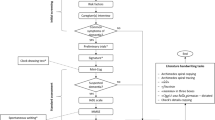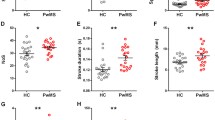Abstract
Background and aims: Despite evidence of cognitive impairment and difficulties in performing daily activities among elderly people with major depression, studies implementing objective performance-based evaluation of functional deficits in this patient population are scarce. With the aid of a computerized device we examined functional handwriting performance among elderly patients with mild Major Depressive Disorder (MDD) in comparison with controls. Methods: Participants were 20 elderly participants with mild MDD and 20 matched controls. Both groups performed four functional writing tasks with a computerized system. Kinematic measures were: in-air time per stroke (temporal), stroke width (spatial), pressure applied (pressure). Results: A MANOVA yielded statistically significant between-groups differences for the four writing tasks across the temporal, spatial and pressure measures. A univariate ANOVA revealed that the significance was due to differences between mild MDD and controls on the pressure measure in all four tasks. Moderately significant correlations were found in all tasks between in-air time and pressure while writing and the GDS score, and between the in-air time of three tasks (except writing one’s name) and the Mini-Mental State Examination (MMSE) score. Handwriting pressure, and temporal and spatial measures of the task of writing one’s name allowed us to classify 84.2% of the participants correctly. Conclusions: Computerized evaluation of handwriting, a daily task, was found to be sensitive to altered performance among participants with mild MDD, and was correlated with cognitive impairment and depression status. The theoretical importance and practical implications of handwriting process measures are discussed.
Similar content being viewed by others
References
American Psychiatric Association (APA). Diagnostic and Statistical Manual of Mental Disorders (4th ed., text rev.). Washington, DC: American Psychiatric Association, 2000.
Fischer C, Schweizer TA, Atkins JH et al. Neurocognitive profiles in older adults with and without major depression. Int J Geriatr Psychiatry 2008; 23: 51–6.
Lesser IM, Boone KB, Mehringer CM, Wohl MA, Miller BL, Berman NG. Cognition and white matter hyperintensities in older depressed patients. Am J Psychiatry 1996; 153: 1280–7.
Butters MA, Becker JT, Nebes RD et al. Changes in cognitive functioning following treatment of late-life depression. Am J Psychiatry 2000; 157: 1949–54.
Hart RP, Kwentus JA, Taylor JR et al. Rate of forgetting in dementia and depression. J Consult Clin Psychol 1987; 55: 101–5.
Sheline YI, Barch DM, Garcia K et al. Cognitive function in late life depression: relationships to depression severity, cere-brovascular risk factors and processing speed. Biol Psychiatry 2006; 60: 58–65.
Wilson RS, Mendes de Leon CF, Bennett DA, Bienias JL, Evans DA. Depressive symptoms and cognitive decline in a community population of older persons. J Neurol Neurosurg Psychiatry 2004; 75: 126–9.
Berger AK, Fahlander K, Wahlin A, Bäckman L. Negligible effects of depression on verbal and spatial performance in Alzheimer’s disease. Dement Geriatr Cogn Disord 2002; 13: 1–7.
Kondo N, Kazama M, Suzuki K, Yamagata Z. Impact of mental health on daily living activities of Japanese elderly. Prev Med 2008; 46: 457–62.
Steffens DC, Hays JC, Krishnan KR. Disability in geriatric depression. Am J Geriatr Psychiatry 1999; 7: 34–40.
Anstey KJ, von Sanden C, Sargent-Cox K, Luszcz MA. Prevalence and risk factors for depression in a longitudinal, population-based study including individuals in the community and residential care. Am J Geriatr Psychiatry 2007; 15: 497–505.
Lenze EJ, Schulz R, Martire LM et al. The course of functional decline in older people with persistently elevated depressive symptoms: longitudinal findings from the Cardiovascular Health Study. J Am Geriatr Soc 2005; 53: 569–75.
Onishi J, Umegaki H, Suzuki Y, Uemura K, Kuzuya M, Iguchi A. The relationship between functional disability and depressive mood in Japanese older adult inpatients. J Geriatr Psychiatry Neurol 2004; 17: 93–8.
Cheng ST, Chan AC. Withdrawal, apathy and lack of vigor in late life depression: factorial validity and relationship to diagnosis. Aging Ment Health 2007; 11: 532–7.
Mehta M, Whyte E, Lenze E et al. Depressive symptoms in late life: associations with apathy, resilience and disability vary between young-old and old-old. Int J Geriatr Psychiatr 2008; 23: 238–43.
Dantchev N, Widlöcher DJ. The measurement of retardation in depression. J Clin Psychiatry 1998; 59 (Suppl 14): 19–25.
Kiosses DN, Alexopoulos GS. IADL functions, cognitive deficits, and severity of depression: a preliminary study. Am J Geriatr Psychiatry 2005; 13: 244–9.
Dixon RA, Kurzman D, Friesen IC. Handwriting performance in younger and older adults: age, familiarity, and practice effects. Psychol Aging 1993; 8: 360–70.
Werner P, Rosenblum S, Bar-On G, Heinik J, Korczyn A. Handwriting process variables discriminating mild Alzheimer’s disease and mild cognitive impairment. J Gerontol B Psychol Sci Soc Sci 2006; 61: 228–36.
Tseng MH, Cermak SH. The influence of ergonomie factors and perceptual — motor abilities on handwriting performance. Am J Occup Ther 1993; 47: 919–26
Rosenblum S, Werner P. Assessing the handwriting process in healthy elderly persons using a computerized system. Aging Clin Exp Res 2006; 18: 433–9.
Schröter A, Mergl R, Bürger K, Hampel H, Möller HJ, Hegerl U. Kinematic analysis of handwriting movements in patients with Alzheimer’s disease, mild cognitive impairment, depression and healthy subjects. Dement Geriatr Cogn Disord 2003; 15: 132–42.
Blazer D. Depression in late life: review and commentary. J Gerontol A Biol Sci Med Sci 2003; 58: 249–65.
Sabbe B, Hulstijn W, Van Hoff JJM, Zitman FG. Fine motor retardation and depression. J Psychiatr Res 1996; 30: 295–306.
Mergl R, Juckel G, Rihl J et al. Kinematiucal analysis of handwriting movements in depressed patients. Acta Psychiatr Scand 2004; 109: 383–91.
Mergl R, Pogarell O, Juckel G et al. Hand-motor dysfunction in depression: characteristics and pharmacological effects. Clin EEG Neurosci 2007; 38: 82–8.
Heinik J, Shaikewitz D. The Clock Drawing Test — Modified and Integrated Approach (CDT-MIA) as an instrument for detecting mild cognitive impairment in a specialized outpatient setting. J Geriatr Psychiatry Neurol 2009 Mar 10. [Epub ahead of print]
Yesavage JA, Brink TL, Rose TL et al. Development and validation of a geriatric depression screening scale: a preliminary report. J Psychiatr Res 1983; 17: 37–49.
Werner P, Heinik J, Mendel A. Examining the reliability and validity of the Hebrew version of the Mini Mental State Examination. Aging Clin Exp Res 1999; 11: 329–34.
Rosenblum S, Parush S, Weiss PL. Computerized temporal handwriting characteristics of proficient and poor handwriters. Am J Occup Ther 2003; 57: 129–38.
Wada T, Ishine M, Kita T, Fujisawa M, Matsubayashi K. Depression screening of Japanese community dwelling elderly people. J Am Geriatr Soc 2003; 51: 1328–9.
Rajji TK, Miranda D, Mulsant BH et al. The MMSE is not an adequate screening cognitive instrument in studies of late-life depression. J Psychiatr Res 2009; 43: 464–70.
Fried LP, Storer DJ, King DE, Lodder F. Diagnosis of illness presentations in the elderly. J Am Geriatr Soc 1991; 39: 117–23.
Yanagita M, Willcox BJ, Masaki KH et al. Disability and depression: investigating a complex relation using physical performance measures. Am J Geriatr Psychiatr 2006; 14: 1060–8.
Gilbertson L, Barber-Lomax S. Power and pinch grip strength recorded using the hand-held JAMAR dynamometer and B+L hydraulic. Br J Occup Ther 1994; 57: 483–7.
Alfaro-Acha A, Al Snih S, Raji MA, Kuo YF, Markides KS, Ottenbacher KJ. Handgrip strength and cognitive decline in older Mexican Americans. J Gerontol A Biol Sci Med Sci 2006; 61: 859–65.
Van Gemmert AWA, Teulings HL, Stelamch GE. Parkinsonian patients reduce their stroke size with increased processing demands. Brain Cogn 2001; 47: 504–12
Jacoby HJ. Self-knowledge through handwriting. London: J.M. Dent & Sons Ltd, 1941.
Taft R. Extraversion, neuroticism, and expressive behavior: an application of Wallachs moderator effect to handwriting analysis. J Pers 1967; 35: 570–84.
Pier MPB, Hustijn W, Sabbe BGC. No psychomotor slowing in fine motor tasks in dysthymia. J Affect Disord 2004; 83: 109–20.
Author information
Authors and Affiliations
Corresponding author
Rights and permissions
About this article
Cite this article
Rosenblum, S., Werner, P., Dekel, T. et al. Handwriting process variables among elderly people with mild Major Depressive Disorder: a preliminary study. Aging Clin Exp Res 22, 141–147 (2010). https://doi.org/10.1007/BF03324787
Received:
Accepted:
Published:
Issue Date:
DOI: https://doi.org/10.1007/BF03324787




